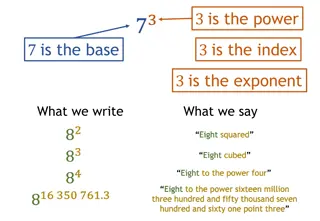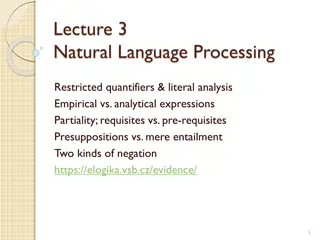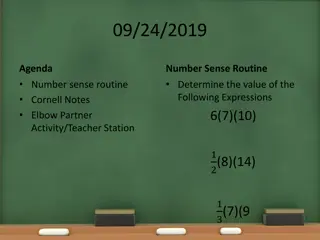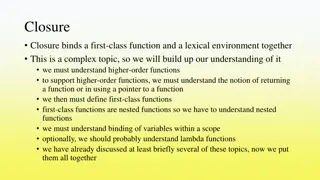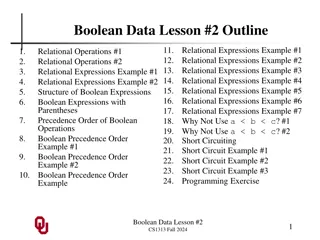Lambda Expressions & Mutability
Lambda expressions are simple function definitions that evaluate to a function. They do not contain return statements or any statements at all. Learn about lambda syntax, differences between lambda expressions and def statements, using lambdas as arguments, and how lambdas work with conditionals in this informative content.
Download Presentation

Please find below an Image/Link to download the presentation.
The content on the website is provided AS IS for your information and personal use only. It may not be sold, licensed, or shared on other websites without obtaining consent from the author.If you encounter any issues during the download, it is possible that the publisher has removed the file from their server.
You are allowed to download the files provided on this website for personal or commercial use, subject to the condition that they are used lawfully. All files are the property of their respective owners.
The content on the website is provided AS IS for your information and personal use only. It may not be sold, licensed, or shared on other websites without obtaining consent from the author.
E N D
Presentation Transcript
Lambda Expressions & Mutability
Lambda Syntax A lambda expression is a simple function definition that evaluates to a function. The syntax: lambda <parameters>: <expression> A function that takes in parameters and returns the result of expression. A lambda version of the square function: square = lambda x: x * x A function that takes in parameter x and returns the result of x * x.
square = lambda x: x * x A lambda expression does not contain return statements or any statements at all. Incorrect: square = lambda x: return x * x Correct: square = lambda x: x * x
Def statements vs. Lambda expressions def square(x): return x * x vs square = lambda x: x * x Both create a function with the same domain, range and behavior Both bind that function to the name square. Only the def statement gives the function an intrinsic name, which shows up in environment diagrams but doesn't affect execution (unless the function is printed).
Lambda as argument It's convenient to use a lambda expression when you are passing in a simple function as an argument to another function. Instead of... def cube(k): return k ** 3 summation(5, cube) We can use a lambda summation(5, lambda k: k ** 3)
Conditional expressions A conditional expression has the form: <consequent> if <predicate> else <alternative> Evaluation rule: Evaluate the <predicate> expression. If it's a true value, the value of the whole expression is the value of the <consequent>. Otherwise, the value of the whole expression is the value of the <alternative>.
Lambdas with conditionals This is invalid syntax: lambda x: if x > 0: x else: 0 Conditional expressions to the rescue! lambda x: x if x > 0 else 0
A tracing function Let's make a higher-order tracing function def trace1(f): """Return a function that takes a single argument, x, prints it, computes and prints F(x), and returns the computed value. >>> square = lambda x: x * x >>> trace1(square)(3) -> 3 <- 9 9 """ def traced(x): print("->", x) r = f(x) print("<-", r) return r return traced
A tracing decorator What if we always wanted a function to be traced? @trace1 def square(x): return x * x That's equivalent to.. def square(x): return x * x square = trace1(square)
General decorator syntax The notation: @ATTR def aFunc(...): ... is essentially equivalent to: def aFunc(...): ... aFunc = ATTR(aFunc) ATTR can be any expression, not just a single function name.
Immutable vs. Mutable An immutable value is unchanging once created. Immutable types (that we've covered): int, float, string, tuples a_string = "Hi y'all" a_string[1] = "I" a_string += ", how you doing?" an_int = 20 an_int += 2 # # Error! String elements cannot be set. How does this work? # And this? A mutable value can change in value throughout the course of computation. All names that refer to the same object are affected by a mutation. Mutable types (that we've covered): list, dictionaries grades = [90, 70, 85] grades_copy = grades grades[1] = 100 # [90, 70, 85] # [90, 70, 85] # grades=[90, 100, 85], grades_copy=[90, 100, 85]
Name change vs. mutation The value of an expression can change due to either changes in names or mutations in objects. Name change: x = 2 # 4 x + x x = 3 x + x # 6 Object mutation: x = ['A', 'B'] # ['A', 'B', 'A', 'B'] x + x x.append('C') x + x # ['A', 'B', 'C', 'A', 'B', 'C']
Mutables inside immutables An immutable sequence may still change if it contains a mutable value as an element. t = (1, [2, 3]) t[1][0] = 4 t[1][1] = "Whoops" View in PythonTutor
Equality of contents vs. Identity of objects list1 = [1,2,3] list2 = [1,2,3] Equality: exp0 == exp1 evaluates to True if both exp0 and exp1 evaluate to objects containing equal values list1 == list2 # True Identity: exp0 is exp1 evaluates to True if both exp0 and exp1 evaluate to the same object Identical objects always have equal values. list1 is list2 # False View in PythonTutor
Mutating lists with methods append() adds a single element to a list: s = [2, 3] t = [5, 6] s.append(4) s.append(t) t = 0 View in PythonTutor extend() adds all the elements in one list to a list: s = [2, 3] t = [5, 6] s.extend(4) s.extend(t) t = 0 # Error: 4 is not an iterable! View in PythonTutor (after deleting the bad line)
Mutating lists with methods pop() removes and returns the last element: s = [2, 3] t = [5, 6] t = s.pop() View in PythonTutor remove() removes the first element equal to the argument: s = [6, 2, 4, 8, 4] s.remove(4) View in PythonTutor
Mutating lists with slicing We can do a lot with just brackets/slice notation: L = [1, 2, 3, 4, 5] L[2] = 6 L[1:3] = [9, 8] L[2:4] = [] # Deleting elements L[1:1] = [2, 3, 4, 5] # Inserting elements L[len(L):] = [10, 11] # Appending L = L + [20, 30] View in PythonTutor L[0:0] = range(-3, 0) # Prepending
Mutation in function calls A function can change the value of any object in its scope. four = [1, 2, 3, 4] print(four[0]) do_stuff_to(four) print(four[0]) View in PythonTutor Even without arguments: four = [1, 2, 3, 4] print(four[3]) do_other_stuff() print(four[3]) View in PythonTutor
Immutability in function calls Immutable values are protected from mutation. Tuple List turtle = (1, 2, 3) ooze() turtle # (1, 2, 3) turtle = [1, 2, 3] ooze() turtle # [1, 2, 'Ninja']
Mutable default arguments A default argument value is part of a function value, not generated by a call. def f(s=[]): s.append(3) return len(s) f() # 1 f() # 2 f() # 3 View in PythonTutor Each time the function is called, s is bound to the same value.





